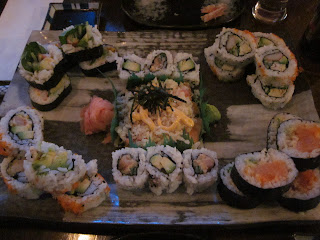Greetings one and everyone. Now I'm no foodie, but I have been writing a research paper about Japanese food, and the appeal of Japanese culture in the west. Also about how to exploit that for business purposes. That is why my lovely wife thought it would be a good idea to take a trip to a Japanese restaurant. Now I'm not really a 'foodie' and this isn't a foodie, blog, but it is a good opportunity to discuss some of the things I've learned.
The mark of authenticity
So we were introduced to this place by Sherri's co-worker who insisted that the place was very authentic. That struck me as interesting as I've been doing a lot of research on what consumers value in Japanese restaurants. Much of what I've been reading talks about the importance of authenticity in Japanese restaurants. It tends to be people's first priority.
"I wanna go for sushi"
"Oh yeah? Where?"
"Somewhere authentic."
Thing is, about 3/4 of the people in the survey I read who held this viewpoint had never been to Japan and had very little basis for determining whether a restaurant was actually authentic or not. I suspect the case of Sherri's co-worker was similar. What matters, business-wise, is not actually authenticity, but perceived authenticity. Does the restaurant match up with people's expectations of what a Japanese restaurant should be like?
According to the literature, there seems to be a formula that most restaurants follow. A Japanese restaurant should have:
1. The beckoning cat when you come in
I don't know much about real Japanese culture other than what I've read, but apparently if this little guy isn't there, you might just be at Denny's.
 |
| It's like Hello kitty had a little too much meow mix |
2. Cozy environment, Japanese music playing, Japanese art on the wall
This plays into the perceptions of what Japanese culture is. I didn't see a bonsai tree or origami anywhere, but there were some pictures of mount Fuji.
 |
| It sure felt authentic |
3. Delicate artful presentation
This octopus salad was pretty delicious. Do they eat that in Japan? I assume so because it's both strange and artfully presented.
 |
| Octopus salad as part of a balanced diet. |
4. Traditional-looking utensils. No forks.
Forks are an immediate red flag for the perceived authenticity of a restaurant. Everyone knows they don't use forks in Japan. Neither do teacups have handles. Lack of teacup handles means authentic Japanese.
 |
| Those little crackers in the bowl were very cute. Just like real Japan. |
4. An authentic-sounding menu menu
A lot of the 'in' crowd judge sushi shops by what they find on the menu itself. Any appearance of California Roll (aka. McSushi) or Sushi Pizza means they've pandered to western tastes in a really obvious way.
 |
| The sushi pizza is the square thing in the middle. It was yummy. |
 |
| I'm not sure how you're interpreting the expression on my face, but it means 'not bad'. |
I have it on good authority that in Japan they do not regularly eat sushi or tempura. It's just too expensive for the average consumer on a regular basis. Doing so would be akin to going out for duck a l'orange for lunch every day. In Japan it is apparently more common to have beef bowl or curry. Nevertheless, we're dealing with perceived authenticity, and tempura and sushi are perceived as authentic.
 |
| The Tempura was very light and tasted Japanese. |
5. A chef who looks somewhat asian
In Japan the sushi chefs have to train for a certain number of years before they are allowed to practice on their own. There is a high level of dedication required to practice their craft. This requirement does not exist in Canada, and as a result many aspiring entrepreneurs with a taste for Japanese culture have started their own restaurants. What matters here is not the actual training of the chef, but whether people perceive him to be a real Japanese sushi chef. As long as the chef is not a white guy with glasses, people feel it's authentic enough.
 |
| Could a white guy make sushi this good? |
It's all for show
In the end, anything related to Japanese culture is staged to a certain degree, and that includes the food. Truly authentic Japanese food wouldn't be as successful in Canada due to different tastes in the mass market. Most Canadians wouldn't crack a raw egg over our beef rice. We like California roll and sushi pizza with spicy mayonnaise because they are somewhat exotic yet safe. But it's ok. Japanese culture is staged in Japan too.Japanese culture is partly for show and has become so popular that even the locals can't tell what is really part of the cultural history and what's put on for tourists anymore. But, then, this staged authenticity happens in all cultures, and is not limited to Japan. Cultural expressions, be they restaurants, dance shows, art exhibits or traditional music, are demonstrations of cultural values. They are not things people do everyday, nor are they accurate reflections of the society at large. They are expressions of the values and history that helped shape the society, and this by definition requires a little showmanship.
 |
| And besides, this restaurant was cute. |
Epilogue
Whenever Sherri and I go out to eat we play the "name 5 ways this place could improve and make more money" game. We had trouble at Aka-Fuji. This place was doing everything right. It was great. Tasty food, perceived authenticity, value for money, well designed and presented, asian chef...There was only one problem. The place was nearly empty on a Friday night. I can't be certain, but I think this was the problem:
 |
| Uh.... where was the restaurant again? |
Anyway it was yummy and great. Check them out. They have a website: Aka-Fuji













2 comments:
Great article, Nathan! And really, this place had the best tempura I've ever had! Good sushi, too.
The people in the survey I read who held this viewpoint had never been to Japan and had very little basis for determining whether a restaurant was actually authentic or not. asian food nashville
Post a Comment